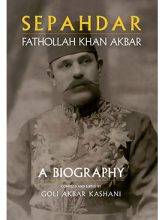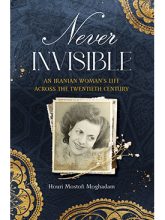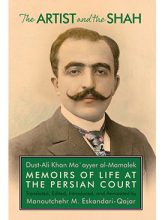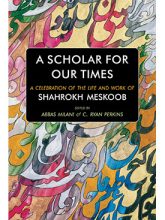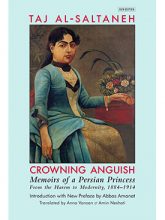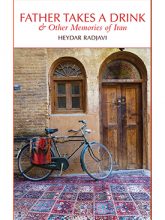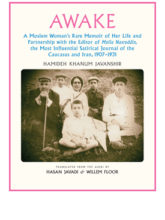Never Invisible: An Iranian Woman’s Life Across the Twentieth Century
Reviews Privilege, along with innate gifts of intelligence and determination, shaped Houri Mostofi Moghadam in many ways, all vibrantly evident in Never Invisible. Drawn from her diaries, it documents the sweep of a long and eventful life as the world around her changed, sometimes for the better, sometimes bringing cruel setbacks. Houri was born into a lofty social stratum in Iran, a milieu of arranged marriages, overseas education for the young, financial comfort, and effective control of political power. Her father–described by her as “a learned man, hard-working, honest, and God-fearing”–was a prominent government official who served in a range of postings abroad and across Iran. Houri’s own exposure to another culture began when she entered a Franco-Persian kindergarten at the age of four. In later years, she would attend university (permitted for women only after reforms by Reza Shah in 1934), teach French and English in a top Iranian high school, spend time in America on a Fulbright grant, and run an important charitable organization with many international members. Always, however, the center of her life was her family–raising three children, running a large household, and supporting the career of her successful businessman husband. In mid-life, trouble arrived in many guises. Her marriage fell apart. She struggled with depression, moved abroad, bought an apartment in Paris, and, from a distance, watched in dismay as revolution broke out in Iran in 1978. In that upheaval, wrath and revenge was aimed chiefly at the upper class: One of her sisters and two uncles were imprisoned for a time. Houri did not return to Iran for 14 years. There, she found her house in ruins– “nothing left of the life we lived there.” Five more times she went back to seek some restitution, always in vain. But that was her way–a tireless fighter for what she saw as right, filling her life with activity and feeling, and brilliantly chronicling the flow of years in her diaries the whole while.[read more>>]
Shadman’s Diaries: The Odyssey of a Young Cleric, 1926-1928
An Encounter with Dylan Thomas
About the Author Raised in Iran, Abbas Milani was sent to be educated in California in the 1960s. He became politically active and in 1974 received a PhD in Political Science. He returned to Tehran and taught at the National University but was imprisoned by the Pahlavi regime in 1977. After the revolution he became a professor at Tehran University, but by 1986 his utopian illusions had been shattered and he emigrated to the United States. Dr. Milani is the Hamid and Christina Moghadam Director of Iranian studies at Stanford University and co-director of the Iran Democracy Project at the Hoover Institution.[read more>>]
The Artist and the Shah: Memoirs of Life at the Persian Court, by Dust-Ali Khan Mo`ayyer al-Mamalek
Crowning Anguish: Memoirs of a Persian Princess from the Harem to Modernity 1884-1914 – 2nd Edition
“A Thousand and One Nights meets Raise the Red Lantern in this tale of growing up among royal wives and concubines in what is now Iran . . . .[read more>>]
Awake: A Moslem Woman’s Rare Memoir of Her Life and Partnership with the Editor of Molla Nasreddin, the Most Influential Satirical Journal of the Caucasus and Iran, 1907–1931
The marriage between Hamideh Khanum, the daughter of a leading aristocratic Azerbaijani family, and Mirza Jalil Mamadqulizadeh, founder and editor of the renowned satirical journal Molla Nasreddin, was a union of like-minded spirits.[read more>>]

